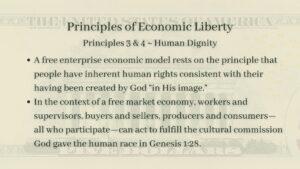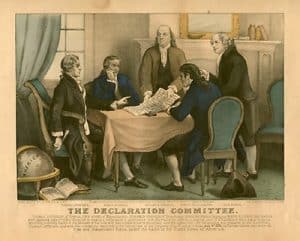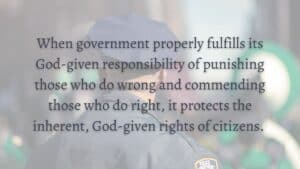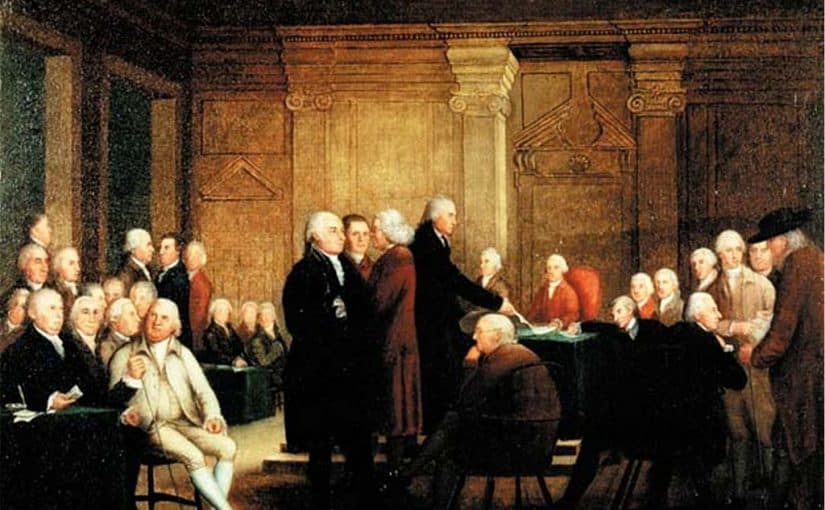—Background information for Session 3—
Remember: You and your group are examining Principle 3 on a list of ten principles highlighting the biblical basis for capitalism. The list is based heavily, but not exclusively, on a paragraph by Dr. Ronald Nash describing capitalism and highlighting its biblical underpinnings.
Principle 3: A free enterprise economic model rests on the principle that people have inherent human rights consistent with their having been created by God “in His image.”

Recognition of Unalienable Rights Means Freedom and Liberty
This section is adapted from this article.
Consider the list(s) you and your group have created (or will create) as you have brainstormed traits that set apart human beings from machines and animals.
While no list is exhaustive, each one still is extremely helpful. People are indeed special. Consider this question: Can the traits or qualities named have resulted from mere chance—random forces at work over many millions of years? Even if (and this is a really big if, but for the sake of conversation, let’s imagine it) random, evolutionary forces resulted in life, how could these forces have given human beings such abstract, idealistic qualities? How could any sense of morality and ethics emerge from random, material forces? The immaterial cannot arise from that which is only material.
Yet people do have a spiritual or immaterial dimension, including a sense of right and wrong. This awareness never could have appeared by random chance. No, humanity isn’t perfect, and the biblical worldview explains why. People are fallen and evil. Even so, they still are great and are markedly different from animals, plants, and inanimate objects. Why? Because God made them in His image. Humanity’s fall into sin marred but did not eliminate that image in each person.
Humanity’s fall into sin marred but did not eliminate God’s image in each person.
Thus, the most reasonable explanation for the uniqueness of the human race is that its members were and are created by a personal and relational God who stamps His likeness on each one.
-
-
- Man is great, but because he rebelled against God,
- he also is capable of great evil.
-
Although they may not have thought of it in exactly these terms, the Founders of the United States of America recognized these two elements of the biblical worldview, took that worldview seriously, and applied it in practical ways when they founded the new nation. We see this so clearly in the Declaration of Independence, which was drafted and adopted in 1776.

We hold these truths to be self-evident, that all men are created equal, that they are endowed by their Creator with certain unalienable Rights, that among these are Life, Liberty and the pursuit of Happiness. — That to secure these rights, Governments are instituted among Men, deriving their just powers from the consent of the governed, — That whenever any Form of Government becomes destructive of these ends, it is the Right of the People to alter or to abolish it, and to institute new Government, laying its foundation on such principles and organizing its powers in such form, as to them shall seem most likely to effect their Safety and Happiness.

Again, the early leaders and statesmen of the new nation—George Washington and Thomas Jefferson among them—understood that the human race truly is great, but also fallen and imperfect. Not all were Christians, but virtually all held to a Christian perspective on life and the world.
With the Declaration of Independence and the Constitution with its Bill of Rights soon thereafter, the Founding Fathers wove into the fabric of the new republic an official recognition of people as creatures of inherent dignity and worth originating from the Creator God. Yet they also crafted a government with checks and balances to prevent those in authority from attaining too much power. They knew that, like liquor, too much power can and will overwhelm and corrupt even well-intentioned men.
With the Declaration of Independence and the Constitution with its Bill of Rights soon thereafter, the Founding Fathers wove into the fabric of the new republic an official recognition of people as creatures of inherent dignity and worth originating from the Creator God.
Therefore, the Founders didn’t just affirm rights, but also responsibilities. Let us not miss the truth that free market capitalism was foundational to the freedoms the new government was charged to protect. This isn’t a popular concept today, because capitalism is vilified, maligned, and extremely misrepresented and misunderstood.

Yet when government does its God-given job and protects unalienable rights by punishing those who do wrong and commending those who do right, God-given rights are protected, and people are free to use those rights to fulfill their responsibilities, many of which also are God-given.
They also are free, within the limits of reality and God’s moral law, to pursue their dreams.
Copyright © 2021 by B. Nathaniel Sullivan. All rights reserved.
top image credit: Robert Edge Pine, the Second Continental Congress Voting on the Declaration of Independence, created between 1784 and 1801
